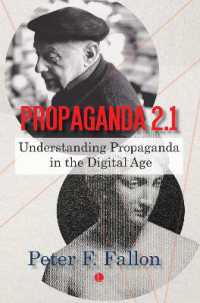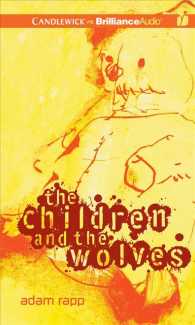- ホーム
- > 洋書
- > 英文書
- > Business / Economics
Full Description
Advances in Accounting Education is a high-quality publication of both empirical and non-empirical research that investigates vital matters within teaching, learning, and curriculum development. By focusing on these topics, this series works to support the improvement of accounting programs at colleges and universities, as well as fostering innovative discussion and significant contributions to faculty development.
This 25th volume features 13 peer-reviewed papers surrounding four themes: curriculum and pedagogical innovations, faculty reflections on teaching accounting during the COVID-19 pandemic, research on passing professional exams in accounting, and historical underpinnings and the choice of taxation as an area of specialization.
Faculty with an interest in accounting education as well as accounting program administrators should find all four themes to be highly informative and interesting. Some practitioners and regulators in the accounting profession may also find useful policy-related nuggets in Volume 25.
Contents
THEME 1: CURRICULUM AND PEDAGOGICAL INNOVATIONS
Chapter 1. Accounting and Audit Quality Perspective: Fair Value Measurements and Disclosures Curriculum Gaps; Thomas R. Weirich and Natalie Tatiana Churyk
Chapter 2. Who's Got Next? An Analysis of the Inhibitors to Mobile Game Adoption in an Introductory Accounting Class; Todd White, Richard G. Brody, and Gaurav Gupta
Chapter 3. A Service Learning Approach to Teaching CVP Analysis in Cost Accounting; C. Andrew Lafond and Kristin Wentzel
Chapter 4. Using the Accounting Equation for Preparing the Statement of Cash Flows; Joseph G. Donelan and Yu Liu
THEME 2: FACULTY REFLECTIONS ON TEACHING ACCOUNTING DURING THE COVID-19 PANDEMIC
Chapter 5. Teaching Forensic Accounting in a Covid Environment; J. Edward Ketz
Chapter 6. Accounting Education in the Time of the Coronavirus or How Flipping the Classroom Heightened my Appreciation for Student Behavior; Timothy J. Fogarty
Chapter 7. Leveraging a University's Dynamic Capabilities in a Turbulent Environment; Carolyn Strand Norman, J. Matthew Sarji, and Thomas Bowe Hansen
Chapter 8. Lecture Modality: Student Attendance Choices and Performance; Kelly Green
THEME 3: RESEARCH ON PASSING PROFESSIONAL EXAMS IN ACCOUNTING
Chapter 9. Do Grades Earned in Accounting Courses Predict Performance on Related Sections of the CPA Exam?; Dennis Bline, Stephen Perreault, and Xiaochuan Zheng
Chapter 10. The Most Effective Study Methods for Passing The CPA Exam: A Research Note; Denise Dickins, Rachel Hull, and Linda Quick
Chapter 11. Perceptions of Challenges on the CPA Exam: Evidence from Puerto Rico; Rogelio J. Cardona, Karen C. Castro-González, Carmen B. Ríos-Figueroa, and José C. Vega-Vilca
THEME 4: HISTORICAL UNDERPINNINGS AND THE CHOICE OF TAXATION AS AN AREA OF SPECIALIZATION
Chapter 12. A History of Tax Education and the Adoption of the AICPA Model Tax Curriculum; Marsha M. Huber, Raymond Shaffer, Renee Castrigano, and Gary Robson
Chapter 13. Accounting Student Selection of Taxation as a Professional Practice Area; Steven L. Gill and Brett S. Kawada







